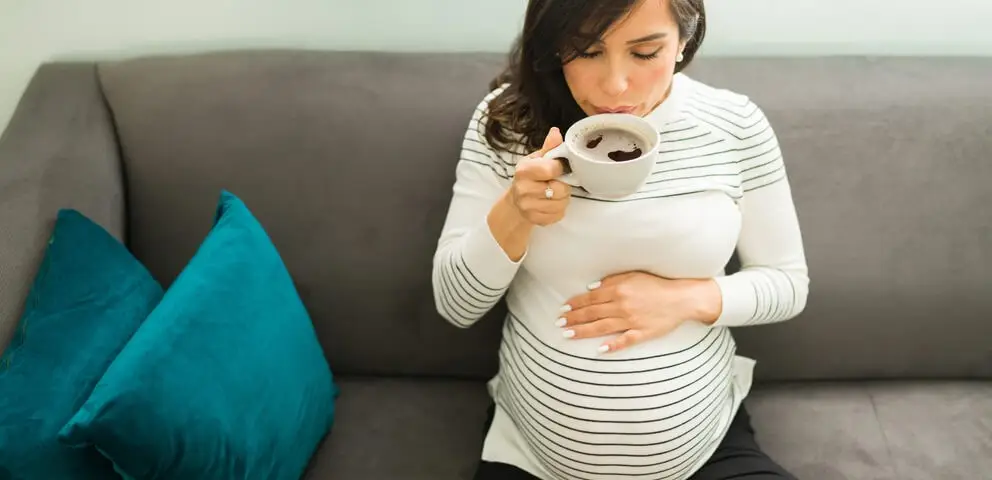
Sophia McCarthy
Operations Manager
How Food and Drink Are Processed During Pregnancy
During pregnancy, it’s important to ensure that you are maintaining the correct level of nutrients to support your growing baby. It is also a time to be more conscious of what stimulants you are consuming on a daily basis. If you love your morning cup of tea or coffee, or need a boost to get you through the afternoon, you may be wondering if its safe to consume the same amount of caffeine while pregnant.
Well, to start, how does the food and drink you consume during pregnancy make its way to your baby? Firstly, the nutrients from the food are absorbed into your bloodstream via your small intestine. These same nutrients that your baby needs to grow and develop in the womb are then delivered directly into the baby’s bloodstream through the placenta. The placenta is connected to your baby via the umbilical cord, which it uses to deliver nutrients, oxygen, hormones and antibodies. Amniotic fluid—which is the fluid your baby floats in—also aids in transferring nutrients to the baby via the amniotic sac. Your baby will also drink amniotic fluid now and again, which we have caught many times on video during our ultrasounds!
Caffeine and It’s Dietary Sources
Caffeine is one of the most widely-consumed substances in the world! Did you know, that due to its affects on our body, it is considered a ‘psychoactive substance’, as it is a mildly-addicting stimulant that speeds up our heart rate, thoughts, actions and even breathing(!). Caffeine—most commonly found in coffee—can also naturally occur in many other foods and drinks, such as teas, chocolate, soft drinks and chewing gum—but to name just a few. According to a 2021 study in the USA: “approximately 70% of women continue to consume caffeine during pregnancy” (NIH). Meanwhile, here in Ireland, we are certainly a country of avid tea drinkers with a casual addiction to our morning cuppa, so it’s safe to say that our statistics are probably similar—if not higher than—the US!
Is Caffeine Harmful During Pregnancy?
According to a sobering study published in 2020 by The Chinese Academy of Sciences, caffeine is absolutely a substance that needs to be carefully monitored during your pregnancy:
“While certain amounts of caffeine consumption can have beneficial effects on certain neurological diseases (e.g., Parkinson’s or Alzheimer’s), some cardiovascular diseases, and even certain cancers…it has also been well documented that maternal caffeine consumption during pregnancy increases the risk of pregnancy failure or gestational complications…the underlying mechanisms of which are just beginning to be revealed.”
The study states that one of the reasons why caffeine can have such a strong effect on a developing baby is due to the fact that: “During pregnancy, caffeine’s metabolic rate in mothers is significantly decreased, especially after the first trimester, and the half-life of caffeine increases from 2.5–4.5 hours to approximately 15 hours towards the end of pregnancy”. They go on to explain that caffeine is ‘lipophilic’ (aka, it dissolves more easily via lipids or fat) “to freely transfer across all biological membranes, including the blood–placental barrier, while neither fetus nor placenta has the enzymes for its metabolism…which potentially affects embryonic development and generates adult-onset diseases.” (NIH).
Meanwhile, closer to home, The Food Safety Authority of Ireland (FSAI) has published a similar warning that:
High caffeine intakes during pregnancy (greater than 400mg per day) have been shown to increase the risk of miscarriage and sudden infant death syndrome. Additionally, a recent study examining caffeine consumption in 2500 pregnant women, showed negative effects on foetal growth from as little as 200mg per day. This negative effect on birth weight increased as caffeine intake increased and was seen even in women who were non-smokers. Smoking during pregnancy is well known to adversely affect foetal growth. (FSAI)
While these stark warning are enough to scare anyone off drinking caffeine, the FSAI has this advice to offer:
“…there is sufficient evidence to suggest that caffeine may be harmful. Considering this, the guideline for the upper limit of caffeine intake in pregnancy has been reduced from 300mg per day to 200mg per day throughout pregnancy.”
Their website also includes a helpful table guide of hidden caffeine levels in everyday foods which can be viewed HERE.
However, it is important to note that the current recommended maximum dose may be still too high for certain individuals. This is why it is so crucial that you consult with your GP and midwife as to what is best and safest for you and your baby.
For more information on the sources discussed in this article, please see the links below
SOURCES
HSE: Caffeine During Pregnancy
Food Safety Authority of Ireland: Caffeine and Pregnancy
NIH The Chinese Academy of Sciences: Impacts of Caffeine During Pregnancy
